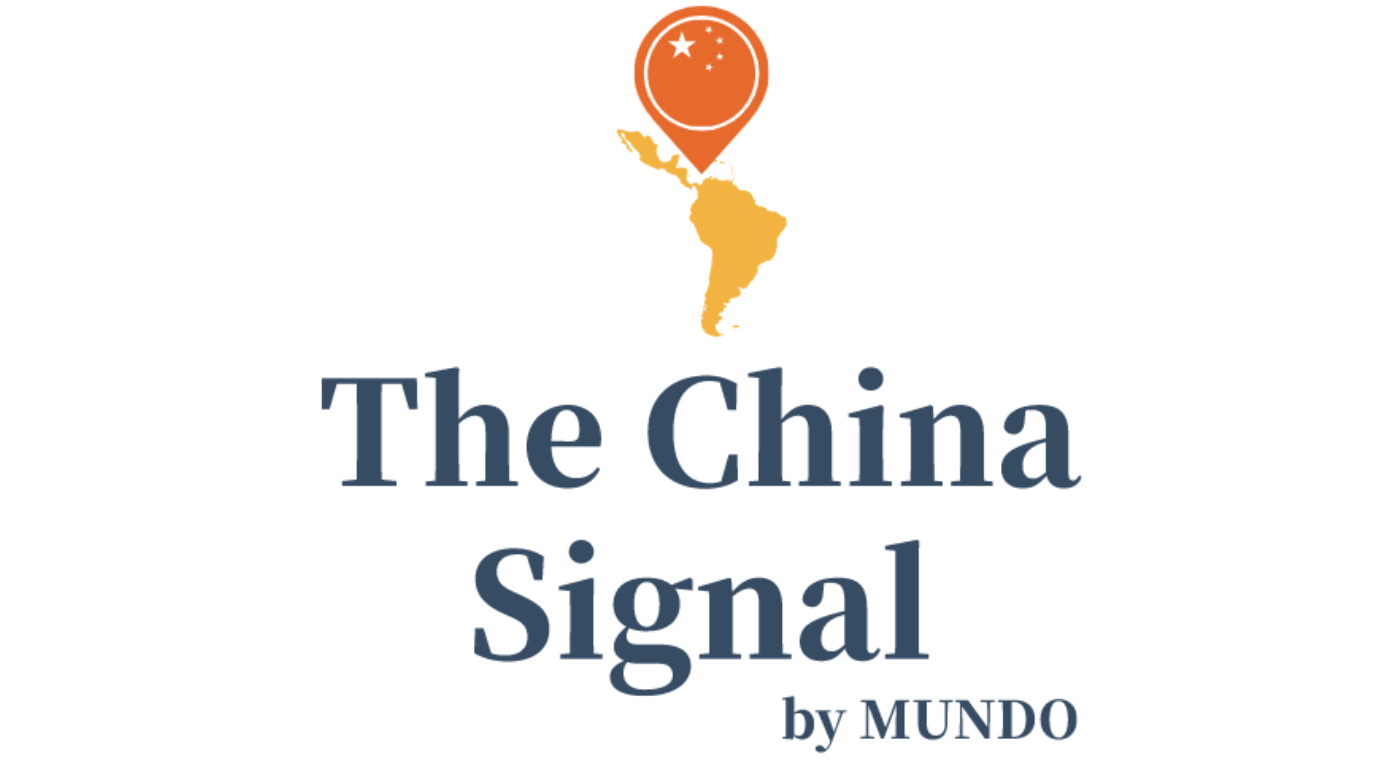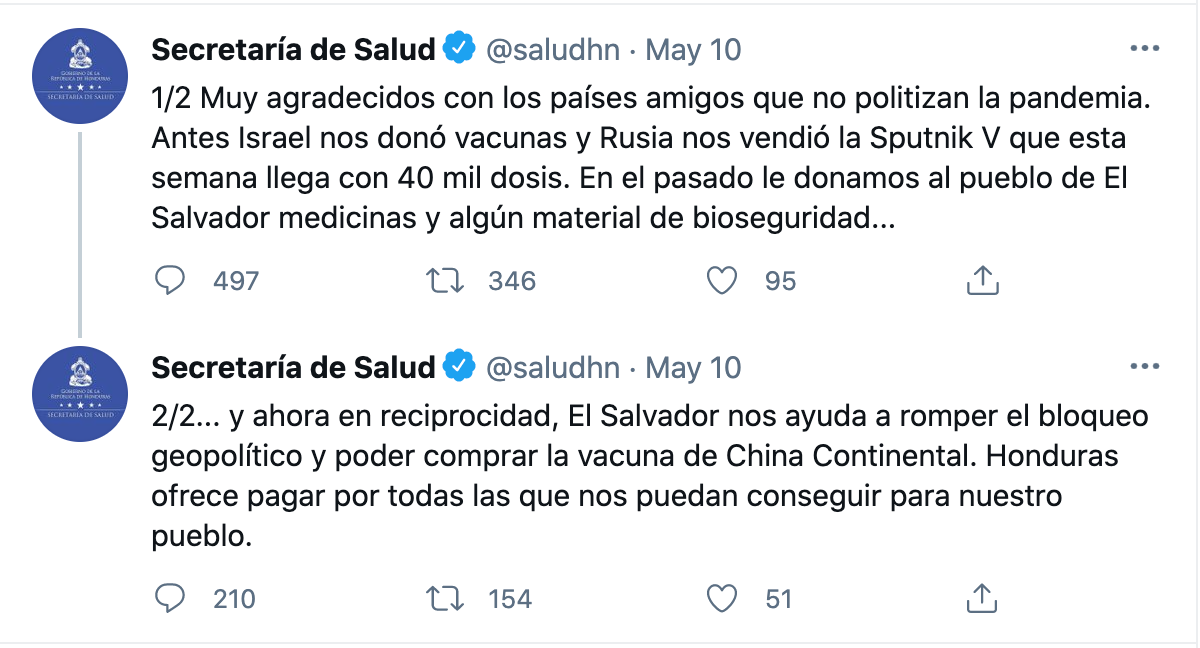The China Signal - May 14
Ganfeng announces takeover of Bacanora, Honduras and Brazil pursue Beijing for vaccine supply, Chinese money launderers and Mexican cartels
G’day, and welcome to The China Signal! This week lithium miner Bacanora announces takeover bid from its major shareholder Ganfeng Lithium; Honduras signals openness to closer diplomatic relations with Beijing in exchange for vaccines; Sinovac’s delayed supply to Butantan stalls Brazil’s vaccine efforts; further details on Chinese money launderers and Mexican cartels; plus much more. Read on.
Also, I’m excited to testify at a hearing of the U.S.-China Economic and Security Review Commission next Thursday May 20. I’ll be testifying on the pandemic’s impact on China’s economic relationship with Latin America and the Caribbean from 11:20am eastern time. You can tune in here.
Critical Minerals
Mexico 🇲🇽
Bacanora announces takeover approach from Chinese lithium major - Investors' Chronicle - May 6, 2021
London’s most promising lithium company Bacanora Lithium (BCN) could be taken private by its largest shareholder Ganfeng Lithium. The two companies have agreed a price of 67.5p, although Ganfeng has not yet made a formal offer.
The Chinese company already owns half of the Sonora lithium project in Mexico and 17 per cent of Bacanora, although this will rise to 29 per cent once a previously-announced share issue takes place, after being approved by the Chinese government.
“Initial site activities” at the Sonora Lithium Project began in February this year. Based on measures of proven and probable reserves, the Sonora Lithium Project is the world’s largest lithium project. However the project comes with complexities, given Sonora state’s history of drug cartel violence, a growing social awareness of lithium mining’s environmental damage without strict ESG governance, and debate over resource ownership in other lithium rich countries Bolivia and Chile.

Bacanora begins early site works at Sonora Lithium Project in Mexico - February 11, 2021
Bacanora Lithium, together with its partner Ganfeng Lithium, has commenced initial site activities at the Sonora Lithium Project located in Mexico.
Located approximately 11km from the town of Bacadehuachi and 170km from the US-Mexico border, the Sonora open-pit strip mine is planned to be developed in two stages.
In the article above from February, Bacanora’s CEO aimed for the Sonora Lithium Project to be a lithium producer by 2023. The Sonora Lithium Project’s February commencement of site activities occurred after Ganfeng exercised their option to increase their stake in the project from 22.5% to 50% earlier that month, via an injection of £21.8m.
The price of lithium has roughly doubled since multi-year lows at the end of 2020.
Diplomacy
Suriname 🇸🇷
On May 8, 2021, State Councilor and Foreign Minister Wang Yi had a phone conversation with Surinamese Foreign Minister Albert Ramdin.
Wang Yi noted that Suriname was one of the first Caribbean countries to establish diplomatic ties with the People's Republic of China, and the upcoming May 28 will mark the 45th anniversary of the China-Suriname diplomatic ties.
Vaccine Diplomacy
Honduras 🇭🇳
Honduran president, in diplomatic shift, says he may open China office | Reuters - May 11, 2021
Honduran President Juan Orlando Hernandez said on Tuesday the Central American nation, a long-standing diplomatic ally of Taiwan, could open a trade office in China in a bid to acquire coronavirus vaccines.
If necessary, his government would open a trade office in China “because it is in the best interest of the Honduran people,” he said in a televised speech.
He suggested Mexico, Chile, Argentina or El Salvador could help his nation acquire Chinese vaccines, and had also asked Taiwan to press the United States to help.
“As we have a relationship with Taiwan, we have asked Taiwan to help us talk with people in Washington because we have been very close allies with the United States. And they have a huge number of vaccines that are going to expire,” Hernandez said.
Ties with Honduras strong despite China vaccine procurement: MOFA - Focus Taiwan - May 11, 2021
Taiwan's diplomatic ties with Honduras remain strong, Ministry of Foreign Affairs (MOFA) spokesperson Joanne Ou (歐江安) said Tuesday, following an announcement by the Central American ally that it plans to procure COVID-19 vaccines from China.
At a regular press briefing, Ou said Honduras did not receive enough vaccine via the COVID-19 Vaccines Global Access (COVAX) mechanism and other procurement arrangements, resulting in a serious public health crisis.
Foreign media has reported that Honduras, a country of nearly 10 million, only received about 250,000 doses of COVID-19 vaccines from COVAX, Israel and Russia.
Brazil 🇧🇷
Following on from TCS May 7:
Sao Paulo authorities plead with China to release vaccines - May 12, 2021
Authorities in Brazil’s most populous state on Wednesday said they have mobilized to try to convince the Chinese government to authorize the export of raw material to make millions of COVID-19 vaccines needed amid a sudden shortage.
The South American nation is highly dependent on a shot made by pharmaceutical company Sinovac for its immunization efforts, and in recent weeks several Brazilian cities have either suspended or delayed vaccinations due to faltering supplies.
The factory that produces the vaccine locally, at Sao Paulo’s state-run Butantan Institute, has slowed production due to lack of raw material, and Brazil’s President Jair Bolsonaro and his economy minister, Paulo Guedes, made statements critical of China this month. Sao Paulo’s Gov. João Doria — an adversary of Bolsonaro’s — implied their comments may have created the bottleneck.
Hours after speaking to China’s ambassador to Brazil, Doria said in a press conference that Bolsonaro and Guedes should apologize to the Asian nation for their recent comments so China can resume exports.
It’s not clear with this article’s phrasing if China’s ambassador implied to Governor Doria that an apology from Bolsonaro and Guedes would trigger a resumption in Sinovac material shipments, or whether Governor Doria was posing this as a solution himself. If it’s the former, Beijing’s vaccine diplomacy to Brazil can’t be characterised as an exercise in soft power, but “sharp” power. The other alternative, as Chinese authorities claim below, is that Sinovac has hit a production bottleneck, possibly exacerbated by a growing domestic inoculation drive within China. I flagged this in TCS April 16.
Brazil’s foreign relations ministry said in a statement Tuesday night it is “permanently following the process of authorization of raw materials export.” It added that foreign minister Carlos França has recently spoken with China’s foreign affairs minister, Wang Yi, seeking more cooperation in the fight against the pandemic
“(Chinese authorities) reiterated that possible delays are not intentional, given that China is exporting raw material to several countries, which brings an extensive demand and overload both in the fabrication of vaccines and ingredients and in bureaucratic procedures,” the foreign relations ministry said in an emailed response to questions.
Spain 🇪🇸
Spain has promised to donate 7.5 million doses of COVID-19 vaccines to Latin American and Caribbean countries this summer as its vaccine diplomacy contrasts with the more cautious approach taken by the United States.
The vaccines that Madrid will send are AstraZeneca, Moderna, Pfizer BioNTech and Johnson & Johnson’s Janssen.
Organised Crime
Mexico 🇲🇽
How Chinese Criminals Secretly Move Millions for Mexico Cartels - InSight Crime - May 12, 2021
While the involvement of Chinese money-laundering rings in handling drug proceeds from Mexico is nothing new, a number of recent court cases in the United States have revealed crucial information about how these schemes work.
They ensured that no money was ever transferred between China and the United States, helping them to avoid detection.
These men presented themselves as legitimate businessmen and had little to no entanglements with the law. Long was the purchasing manager for his family’s toy and clock business, selling products in Mexico, where he had investments in hotels and restaurants. Gan owned a seafood business in Guadalajara, exporting jellyfish to China, according to Reuters.
“Many of these brokers are also engaged in legitimate business, and use that business as cover for and to further money laundering activity,” said US attorneys in Gan’s sentencing memorandum.
Large sums of money being transferred between China and the United States on a regular basis might raise suspicion. Therefore, these launderers chose a scheme that ensured this would never happen.
Once the cash was in the hands of the launderers, they contacted one among a network of Chinese-owned businesses in the United States and Mexico. They asked them to transfer a correspondent amount of money through Chinese banking apps. This happened entirely through the Asian country’s domestic banking system and outside the purview of US authorities.
This technique also allows the laundering process to avoid scrutiny in China. The country’s financial regulators limit private individuals from handling more than $50,000 in foreign currency and any transfers surpassing this limit must be granted special dispensation. However, there is no such limit on domestic transfers.
But regulating the use of Chinese banking apps from the United States and Mexico is no easy task.
China has not seemed eager to help. Two sources within the US justice system told Reuters in December that requests for support had not been answered.
Overviews
Dominican Republic 🇩🇴
Chinese engagement in the Dominican Republic: An update - May 7, 2021
TCS reader Evan Ellis’ latest in his series of China-LAC bilateral reviews. In his own words via email, Ellis argues in his article that:
…as in El Salvador and Panama which also switched relations to the PRC in recent years, few of the projects promised by the PRC in exchange for the change have gone forward, and the country's trade terms with the PRC have worsened. It finds that the Covid-19 pandemic has played a role, as well as the desire of the Abinader government and many Dominicans to maintain close ties with the US. Nonetheless, the PRC has sold a million doses of Covid-19 vaccine to the country, plus an additional gift of 50,000 (what my Dominican friends call the "anayapa"-the token gift that shopkeepers give their clients to thank them for their business). With the vaccine, the Abinader government has made an unexplained reversal on last November's commitment not to let the PRC into strategic sectors, permitting Huawei equipment as part of 5G, raising speculation about what is to come.





